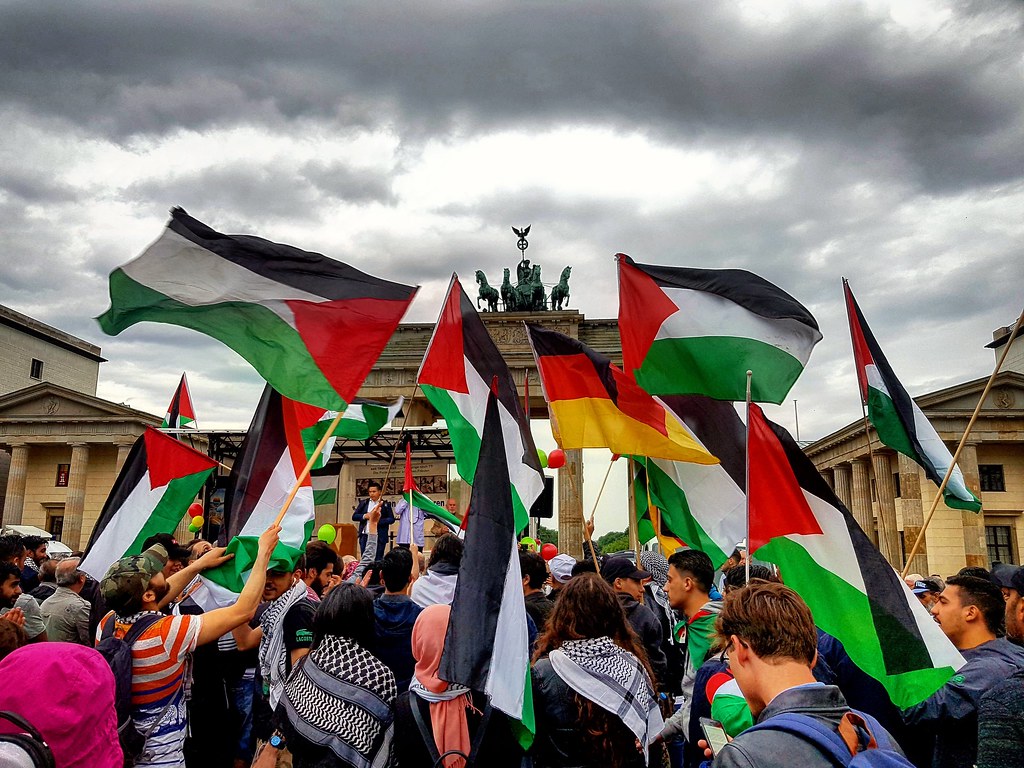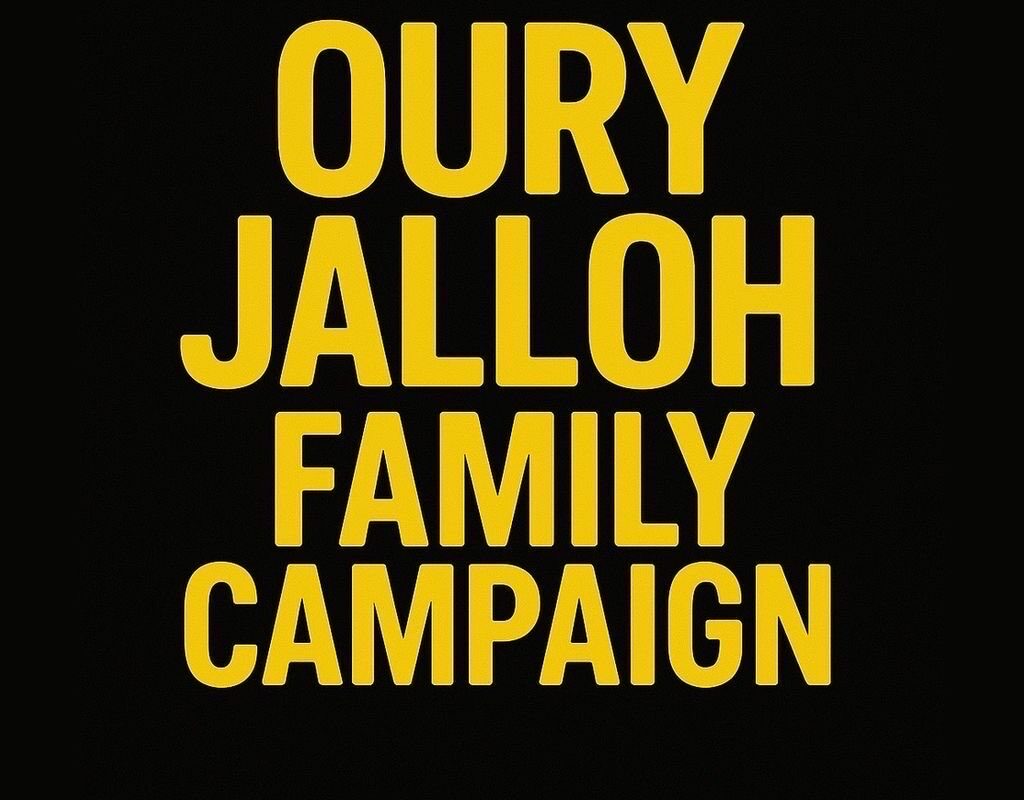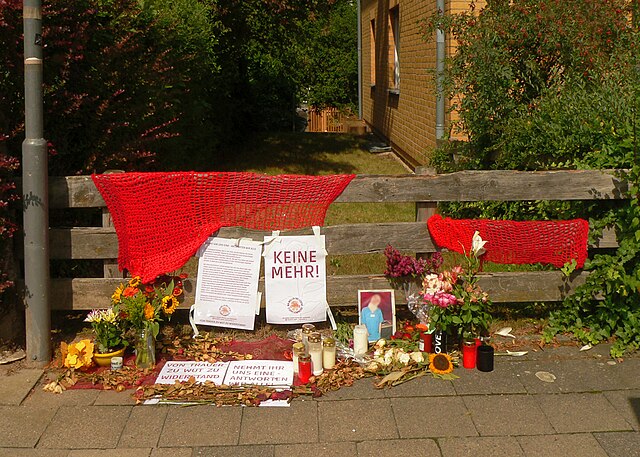The German police and state have been criminalising solidarity with Palestine for decades, from resolutions against the BDS movement in 2019 to banning Nakba anniversary commemorations in 2022 and 2023.
For the past 22 months, the German government—particularly in Berlin—has intensified its attacks on the Palestine solidarity movement, justifying its actions through Staatsräson, or unconditional support for the genocidal state of Israel. Bans and cancellations of events, speakers, talks, and exhibitions have become the norm.
Peaceful demonstrations have been systematically attacked by riot police, who have made thousands of arrests and left many injured—some seriously. Riot police also evicted student occupations and camps at the so-called Free University of Berlin and Humboldt University after the university presidents reported their own students. Police investigators are now monitoring social media, likely with AI assistance, to track down the infamous “imported antisemitism”—while ignoring the homegrown kind, “made in Germany.”
Most cases involving detained individuals, and many targeted through police surveillance on social media, are handed over to the Berlin public prosecutor’s office. The latest estimates suggest that, since 7 October alone, there have been 9,000 proceedings in Berlin.
An unknown number of these cases are dismissed or settled out of court, while the rest proceed to trial. The volume of cases related to Palestinian solidarity since 7 October has been so high that the public prosecutor’s office reorganized the section responsible for hate crimes after the latest phase of the genocide. As a result, most cases are now handled by Section 231, which also investigates antisemitic offences and so-called “criminal” acts during demonstrations. All of these defendants are being tried in Berlin’s criminal court.
The court’s cases fall into three interrelated categories, all stemming from the police actions described above.
1. “Offences” related to slogans and symbols deemed antisemitic or linked to organizations designated as terrorist in Germany, such as the Samidoun network or Hamas. These include slogans like “From the River to the Sea, Palestine Will Be Free,” “Zionists are fascists, they kill children and civilians,” as well as symbols like red triangles and raised fists.
2. Trials of students reported by their universities for attempting to initiate political discussions on campus and demanding an end to institutional collaboration with the genocide in Gaza. These individuals are typically charged with trespassing and disturbing the peace.
3. Arrests carried out at demonstrations and sit-ins, typically after slogans are chanted or “dangerous” symbols—such as watermelons—are displayed. Riot police then enter aggressively in groups of 10 to 15 to make arrests. For each arrest, they often detain additional people, accusing them of interference or verbal assault. Arrests also occur when police unilaterally declare a demonstration over. Recently, there has been a rise in arrests of individuals already “known” to the police.
Nearly all those arrested under these three categories are charged with resisting arrest. Those who are injured, many of whom require hospitalization, are often additionally accused of assaulting the police.
4. Trials concerning social media posts, often involving the use of “prohibited” slogans or statements considered Holocaust denial in Germany. This includes any comparison between the genocide of the Palestinian people and the German genocide of the Jewish people—even when made by anti-Zionist Jews whose families may have been exterminated by the very predecessors of those persecuting them today.
All of these cases are tried in Berlin’s central criminal court, with an excessive number assigned to the court’s high-security chambers. It is, to say the least, astonishing that 19-year-old students accused of trespassing—or peaceful protesters—are treated as dangerous criminals in a country where racist murders routinely go unpunished.
These trials offer a glimpse into the psyche of the German state. Defendants—especially Palestinians—frequently face racist and paternalistic comments, accused of disturbing the German rule of law simply for protesting the extermination of their family members and friends. Many experience their first humiliation when judges, upon asking where they come from, refuse to write “Palestine” and instead label them as stateless.
Many judges still passionately cite 7 October and the protection of Jewish life in their verdicts, while entirely ignoring the genocide, classifying it as a matter of “freedom of opinion.” In other words, the existence of an ongoing genocide is not treated as fact, but as a debatable opinion.
Verdicts and sentences often hinge on three main factors: the judge, the skin colour of the accused (with darker skin seemingly a frequent disadvantage—especially when the goal is to “teach a lesson” about integrating into German society), and whether video evidence exists from the moment of arrest. Such footage is crucial in countering the police narrative, which the courts tend to accept, sometimes despite obvious contradictions.
Particularly ridiculous are the trials for contempt of authority. The Berlin police appear genuinely offended when those they pepper-spray or beat respond by insulting them.
A new wave of trials is being driven by Zionist activists who incite violence at demonstrations and then accuse protesters of misconduct. The police, without collecting evidence, arrest the identified individuals, and prosecutors take the cases to court. Most of these trials end in “not guilty” verdicts, but this has not deterred the activists, the police, or the prosecution from continuing to criminalize whomever they choose.
A German politician known for attending anti-genocide demonstrations—flanked by at least ten police officers, holding flowers, and a sign reading “rape is not resistance”—has been raising money online while accusing anyone who challenges her. Among them is journalist Jakob Reimann, whom she accused and temporarily prevailed against in court, simply for quoting her verbatim, including a video clip of the interview. In that footage, this German Zionist made startling statements about reports then emerging concerning Israeli torture prisons, including rape.
Reimann’s statement on the day of his verdict captured the resolve of pro-Palestinian activists: no matter how relentless the state’s lawfare becomes, they will not stop until they see a free Palestine.
“We are, of course, disappointed that the right-wing influencer Karoline Preisler managed to push through her attack on press freedom. But in a Germany governed by “Staatsräson,” which unconditionally and unwaveringly sides with the far-right Israeli regime despite the extreme crimes committed by the IDF, such a verdict hardly comes as a surprise.
We reject the opposing side’s claim that Preisler’s reference to the ‘more humane actor’ was about the alleged prosecution of rape allegations in Israel, and we were able to refute this on several points. However, the presiding judge made it clear from the outset that she was siding with the plaintiff’s position. That Preisler used such words at all in the context of brutal rapes is symptomatic of the appalling brutalization we are witnessing in the German discourse on Israel-Palestine.
We will not give up and will appeal the verdict.”




